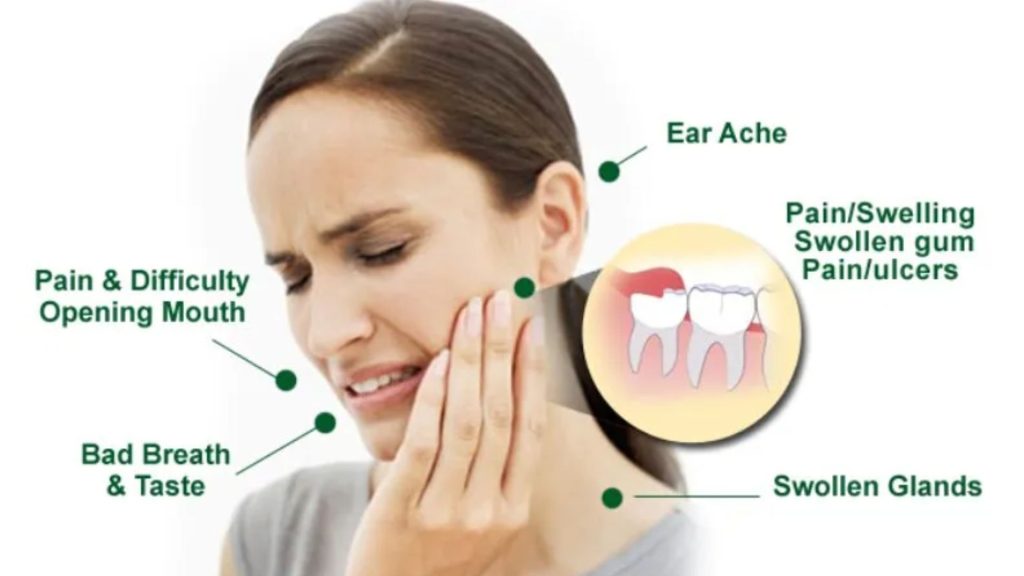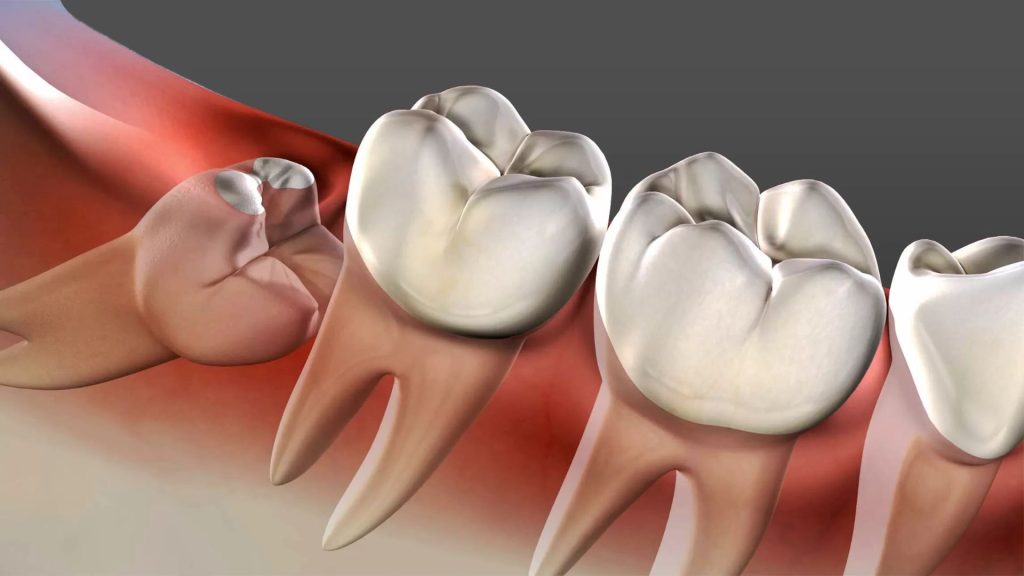Individuals who may experience fluctuations in wisdom tooth pain typically include young adults aged 17 to 25. Those with impacted or partially erupted wisdom teeth are particularly susceptible. Individuals with existing dental issues, such as gum disease or cavities, may also experience this discomfort.
This article explains the reasons behind the fluctuating pain. This is crucial for individuals to proactively manage their oral health, minimize discomfort, and determine when to seek professional dental care.
Wisdom Tooth Discomfort Symptoms

Different people may have different symptoms and indicators of wisdom tooth burning pain due to variables including the position, form, and condition of the wisdom teeth. However, many individuals share the same indications and symptoms:
- Pain and soreness
- Swelling and redness
- Difficulty eating and speaking
- Antibacterial Odor
- Headache
Why Does Wisdom Tooth Pain Come And Go?

Wisdom tooth pain comes and goes primarily due to the tooth’s eruption process and the surrounding conditions. As the teeth emerge, various factors such as inflammation, impaction, and external triggers contribute to the fluctuating nature of the discomfort.
During the eruptive process, pain increases when the tooth pushes through the gums. This discomfort tends to spike during certain growth phases, leading to periods of heightened pain followed by relief.
Impaction and shifting also play a role. Impacted or misaligned wisdom teeth can press against neighboring teeth, causing intermittent pain as they attempt to move into position.
Inflammation and infection around the wisdom teeth can lead to varying pain intensity. Inflamed gums and occasional infections result in flare-ups of pain, followed by temporary relief.
External factors like chewing, temperature changes, and jaw tension can trigger or exacerbate pain. These activities can cause sudden discomfort, contributing to the sporadic nature of wisdom tooth pain.
When does wisdom tooth pain become intermittent?
Wisdom tooth pain usually lasts a few days to a week as the tooth breaks through the gum line. If complications like impaction or infection occur, the pain can persist for weeks or longer. Pain often becomes intermittent during the eruption process, which can take up to a year or more for some.
Initially, the pain is constant due to inflammation or impaction, but it decreases as the teeth emerge. Chewing, temperature changes, or infections can trigger pain flare-ups.
Seeking early dental care helps manage pain and prevent complications.
How to Relieve Wisdom Tooth Pain?
Cold Compress
You can apply an ice pack to the affected area for 15-20 minutes at a time. The cold helps numb the pain and reduce swelling by constricting blood vessels. This method provides temporary relief, but it’s important to remember that it doesn’t address the underlying cause of the pain.
Saltwater Rinse
We recommend mixing half a teaspoon of salt in a glass of warm water and rinsing your mouth several times a day. This simple solution works as a natural disinfectant, helping to reduce inflammation and keep the area clean. While it can help manage discomfort, it is not a permanent fix. For long-term relief, it’s best to consult your dentist.
Consult Your Dentist
If the pain persists or worsens, it’s important to visit your dentist. Your dentist will evaluate your condition and provide appropriate treatment options, which is the best way to relieve the pain and prevent further complications.
Conclude
Wisdom tooth pain can have many causes, and understanding its recurrence is key to managing discomfort. We recommend seeking professional treatment for wisdom tooth pain. At Spring Orchid Dental Clinic Bassendean, we offer expert wisdom tooth pain inspection and care services.
Our experienced dentists and advanced technology ensure you receive top-quality oral health treatment. Visit us for a thorough examination of your wisdom teeth, professional advice, and information on available treatment options. We are always ready to help you maintain a healthy smile and overall health.
FAQs
Are Occasional Wisdom Tooth Pains Normal?
Yes, wisdom tooth discomfort is a natural aspect of the wisdom tooth growing process. Wisdom teeth, or tooth number 8, emerge last in our upper and lower jaws between late teens and early 20s. Wisdom teeth may produce a variety of symptoms including discomfort as they emerge.
Symptoms of wisdom teeth include swelling, redness, and inflammation in the region surrounding the wisdom teeth. Wisdom teeth pulling on neighboring teeth may cause pain, as might infection. Occasionally, wisdom teeth discomfort might persist for a few days.
When Should Wisdom Teeth Stop?
Wisdom teeth typically stop growing by the mid-twenties, with most individuals experiencing full eruption or settling of these teeth by age 25. Although they usually begin to emerge between ages 17 and 25, some may see growth later. Importantly, even if impacted, wisdom teeth do not stop growing. You should seek dental intervention to prevent complications.
Which Wisdom Teeth Aches Most?
Since discomfort and pain are subjective, there is no hard and fast rule as to which wisdom teeth are the most painful. Wisdom tooth pain and discomfort may be influenced by a number of factors:
- Position of wisdom teeth: Wisdom teeth may develop anywhere in the mouth. Wisdom teeth that develop at an angle or impinge on neighboring teeth might cause extra pain.
- Possibility of eruption: The wisdom teeth stuck beneath the mucosal surface or bone might produce pressure and discomfort.
- Size and shape of wisdom teeth: Wisdom teeth vary in size and form. Large, uneven wisdom teeth emerge more slowly than little, tapering ones.
- Personalization: Different people have different pain thresholds. One person may suffer tremendous pain while another hardly notices.
How often should I apply an ice pack to my wisdom tooth?
After wisdom tooth removal, it is recommended to apply an ice pack for 15-20 minutes at a time, followed by a 20-minute break. This cycle can be repeated during the first 24 to 48 hours post-surgery to effectively reduce swelling and alleviate pain. It’s important to wrap the ice pack in a cloth to prevent skin damage and avoid applying it directly on the surgical site. After the initial 48 hours, warm compresses may be more beneficial for promoting healing and reducing stiffness in the jaw.





